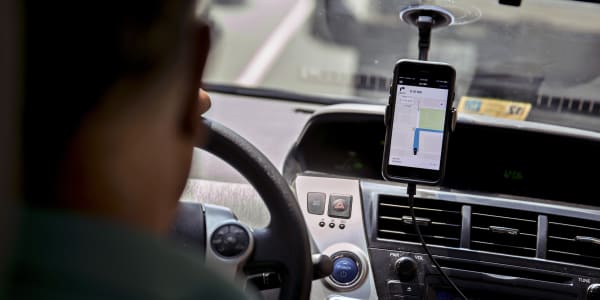
Getting a high-tech car is now much cheaper than it used to be.
Instead of buying a new vehicle, start-ups like Voyomotive are introducing apps and accessories that help drivers turn "dumb" vehicles into smart connected cars.
The Voyo system allows users to retrofit cars sold in the U.S. after 1996 — cars that were fitted with an on-board diagnostics II (OBD-II) port — with modern technologies.
In addition to obvious bells and whistles like unlocking a door from your phone, Voyomotive wants to capture the data cars generate to reveal insights about driving habits, performance and maintenance. (This data are usually only available at car service centers.)
The Voyo controller plugs in under the dashboard and connects via Bluetooth with a smartphone app that sends data to the cloud. The device, which costs $100, has already had over 1,000 preorders on Kickstarter, where the company first sold Voyo. The standard package includes in-app tracking for multiple vehicles, car mileage, fuel consumption — down to the individual trip — as well as notifications about driver behavior, like speeding and hard stops. But it's the more tangible features that early adopters really like, said CEO Peter Yorke.
"They are really excited about Lock/Unlock because that really changes how they are using their car on a daily basis," he said.
For an annual $30 fee, users can subscribe to cloud services including more advanced diagnostics, the ability to lock and unlock doors without opening up the app — via a proximity sensor connected to an authorized smartphone — and a fuel saving feature that automatically turns off an idling engine, among other things. Some premium features also require the purchase of a $50 relay device.
Voyomotive is launching in the consumer market, but the real opportunity lies in working with dealers and companies managing fleets of vehicles, said Yorke. The company expects to sell millions of units per year.
"I really admire what Voyo is trying to do with this technology," said Forrester analyst James McQuivey. "If we wait for the automakers to do this, then it will take years because we all have to wait until we buy a car that was a relatively recent make before we start getting these benefits."
The potential market for such products is likely limited to a small number of regional fleets and a dwindling group of car enthusiasts, he said. "There is still a handy group of people in this category, whether they are in the Fiat group or Jeep Wrangler community, or in any number of specific niches," he said.
The average consumer does not value the type of data that Voyo collects to make a purchase, said McQuivey. Most large fleets — from Uber to UPS — are either content with the information they get from apps or already have the technology built in, he said. The market for Voyo and similar products will eventually be in the single digit millions and will last about a decade until most cars come with the technology embedded, he estimated.
In the long run, the more successful route into the connected car will likely be through in-dash entertainment systems, like those that Apple and Alphabet are working on, he said.
"What consumers really care about — if they don't tie their identity to their vehicle — is the in-car experience," said McQuivey. "It's about the entertainment, it's about the communication they can have."
"What Voyo is doing as a stand-alone product will become a feature for a more in-car experience solution that will have higher salience for consumers," he said.
Greater access to data about a car's history and performance will eventually drive massive change in the way cars are bought and sold, said McQuivey.
"Suddenly, you are not buying a type of car based on its general average performance. You are buying a specific car that has been used in a certain way," he said.
Car manufacturers are wrestling with just how much data to make readily available to consumers, said McQuivey. It's an area that is fraught with regulatory and legal concerns.
"What if the engine code said everything was fine and then there was a fatal problem in the engine that was undetected and it caused a fatal accident?" he said. "Now you have got a trail of data that shows that you should have known, but didn't, that vehicle needed a recall."
"Having that data be public somewhere would be absolutely devastating to them," he said.





